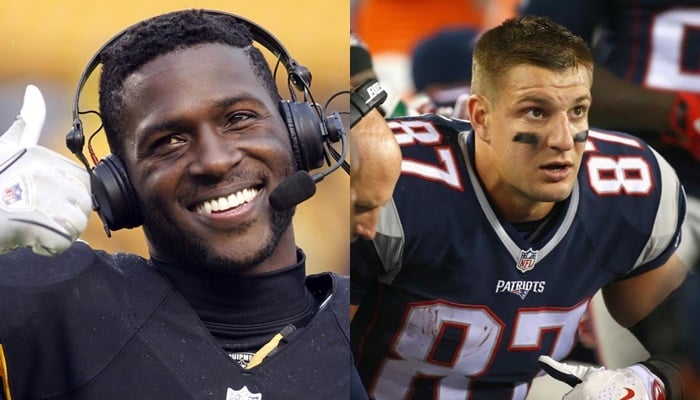Posted on August 1, 2016, by Travis Pulver
The New England Patriots knew within his first couple seasons in the league that Rob Gronkowski was going to be special. The same can be said for how the Pittsburgh Steelers felt about Antonio Brown. Both ended up living up to expectations and then some.
Gronkowski can take over a game on his own (not entirely of course; the quarterback has to do his job). If the New England Patriots need someone to make a big play to get them back in a game, they know they can count on the Gronk.
The same can be said about Antonio Brown. Over the last two seasons, Brown as made the Steelers and fantasy football players very happy by setting a new NFL record with 264 receptions. To call him a pass-catching machine does not do justice to the threat he poses to opposing teams.
Both players have been busy rewriting the record books the last few years and have contributed significantly to the overall success of their respective teams—but yet, both remain grossly underpaid.
Gronkowski and Brown both have high hopes that they will get paid what they are worth sooner rather than later. However, they shouldn’t expect it to happen and not because their teams do not respect the value they bring to the team.
Like Bob Sugar said: It ain’t show-friends; it’s show business!
Both players have outperformed their contracts, but thanks to the business side of the game they are likely going to be stuck being underpaid till the final years of their respective deals. Not because they haven’t shown enough.
It’s just business.
A good business man knows a deal when he sees one. Their respective general managers did which is why they gave each player an extension after their first two years. The move is generally not made because players don’t typically do enough to warrant that kind of faith, but Brown and Gronkowski did.
Brown had outperformed his contract as a sixth-round pick, but the deal the Steelers gave him (a five-years, $42.5 million) required a heck of a leap of faith on the team’s part. The deal made him the 11th highest paid receiver in the league
Gronkowski, on the other hand, had outplayed his rookie deal and had established himself as the premier pass-catching tight end in the league. So they paid him accordingly with the largest contract ever or a tight end, $54 million over six years.
Both teams were taking a risk that their guy would continue to develop and live up to (or exceed) their contract, much like they do for every player. Sure enough—they did.
Antonio Brown thinks that means it is time for a pay raise:
“You have to take care of your guys,” Brown said after Sunday’s practice (ESPN). “If a guy underperforms, you get rid of him. If a guy overperforms, you take care of him.”
Not necessarily. Teams do not pay guys for what they have done, but for what they hope a guy will do. If he happens to do better than expected—great. That means they negotiated a smart deal and got a bargain. The more bargains they find, the more money the team makes.
It’s basics business.
Does Antonio Brown deserve a raise? Does Rob Gronkowski (whose agent the Patriots have begun talks with)? Absolutely—but deserving people go without raises all the time. These guys already have contracts that spell out exactly what they are due to be paid. The teams could renegotiate or restructure contracts to make their player feel more valued. But there is no contractual obligation to do so.
So—does this mean guys should not play to the best of their abilities until the last year of their contract? Absolutely not because the more a player proves he can do, the more he should be paid when it does come time for a new contract.
Fair? No, but that’s business.

